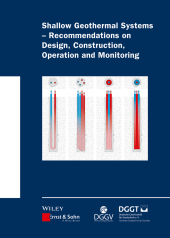 Neuerscheinungen 2016Stand: 2020-02-01 |
Schnellsuche
ISBN/Stichwort/Autor
|
Herderstraße 10
10625 Berlin
Tel.: 030 315 714 16
Fax 030 315 714 14
info@buchspektrum.de |

Deutsche Gesellschaft für Geot, Deutsche Gesellschaft für Geow
(Beteiligte)
Shallow Geothermal Systems - Recommendations on Design, Construction, Operation and Monitoring
Herausgegeben von Deutsche Gesellschaft für Geotechnik e.V.; Deutsche Gesellschaft für Geowissenschaften e.V.
1. Auflage. 2016. 312 S. 20 SW-Abb., 33 Farbabb., 27 Tabellen. 210 mm
Verlag/Jahr: ERNST & SOHN 2016
ISBN: 3-433-03140-1 (3433031401)
Neue ISBN: 978-3-433-03140-7 (9783433031407)
Preis und Lieferzeit: Bitte klicken
Die Empfehlungen fassen den Stand der Technik zusammen. Das Ziel ist die fachgerechte Erschließung des Untergrunds für geothermische Zwecke sowie die Vermeidung von Schäden für den Boden und das Grundwasser einerseits und für den Betrieb der Anlage sowie der Bebauung andererseits. Die Empfehlungen sollen als Arbeitshilfe die optimale und nachhaltige geothermische Nutzung des Untergrunds am konkreten Standort in Beratung, Planung, Bauausführung und Betrieb begleiten. Die Fach- und Genehmigungsbehörden erhalten die Möglichkeit, sich bei ihren Entscheidungen und Vorgaben an den Empfehlungen zu orientieren.
1. Einleitung
2. Grundlagen
3. Geothermische Anlagen4. Rechtliche Grundlagen
5. Grundlagen der Planung
6. Bohrungen und Ausbau
7. Planung, Herstellung und Betrieb geschlossener Systeme
8. Planung, Herstellung und Betrieb offener Systeme
9. Risikopotenziale
Literatur
Glossar
The recommendations summarise the state of the art. Their aim is the proper exploitation of the ground for geothermal purposes without adversely affecting the ground or the groundwater on the one hand and the operation of the system and nearby buildings on the other. The recommendations should be used during consulting, design, installation and operation in order to achieve optimum and sustainable use of the ground at a specific location. Authorities responsible for supervising and approving projects can use the recommendations as a guide when taking decisions and making stipulations.
The Geothermal Energy Study Group was set up in Bochum in 2004 and became the joint DGGV/DGGT study group in 2007. Some 20 specialists from universities, authorities and engineering consultants are active in the group and meet two or three times a year.
1 Introduction
2 Principles
3 Geothermal energy installations
4 Legislative principles
5 Planning principles
6 Boreholes and completion
7 Design, construction and operation of closed systems
8 Design, construction and operation of open systems
9 Risk potential
The study group Geothermie is a joint study group working since March 2007. Its members are of the section Hydrology of the Deutsche Geologischen Geselschaft - Geologische Vereinigung e.V. (DGGV, formerly DGG) and the section Ingenieurgeologie of the Deutsche Gesellschaft für Geotechnik e.V. (DGGT) and the DGGV.


